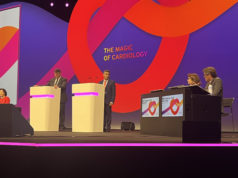
The timing of dosing of antihypertensive medication—whether it is taken in the morning or in the evening—does not have a bearing on cardiovascular outcomes, randomised trial results presented during a hot line session at the European Society of Cardiology (ESC) annual congress (26–29 August, Barcelona, Spain) indicate.
The TIME study—a prospective, randomised trial, involving over 21,000 patients from the UK—set out to test whether evening dosing of antihypertensive medication improved major cardiovascular outcomes compared with morning dosing. Previous research, including the MAPEC trial, has indicated that taking antihypertensive medication at night may reduce cardiovascular events and mortality.
“Taking prescribed blood pressure tablets in the evening was no better, or worse, than taking them in the morning for the prevention of cardiovascular disease,” lead investigator Tom MacDonald (University of Dundee, Dundee, UK) told an ESC press conference, at which he previewed the results of the trial.
“Taking medication in the evening was not harmful, as far as we could detect, and patients, we can conclude, can take their blood pressure medication in either the morning or the evening, as the timing makes no difference to cardiovascular outcomes,” MacDonald said.
Through the trial, more than 21,000 patients with high blood pressure were followed for over five years. Adults taking at least one antihypertensive medication and with a valid email address were recruited by advertising in the community, from primary and secondary care, and from databases of consented patients in the UK.
After participants had signed up to participate on the TIME website and their eligibility was confirmed, they were randomised 1:1 to take their usual antihypertensive medication in the morning or the evening. The composite primary endpoint was hospitalisation for non-fatal myocardial infarction (MI) or non-fatal stroke, or vascular death, in the intention-to-treat population. Information on hospitalisations and deaths was obtained from participants by email and through record linkage to national databases and further data was gathered from family doctors and hospitals and independently adjudicated by a committee blinded to allocated dosing time.
A total of 21,104 patients were randomised, 10,503 to evening dosing and 10,601 to morning dosing, MacDonald detailed. The average age of participants was 65 years, 58% were men and 98% were white. The median follow-up duration was 5.2 years but some were in the study for over nine years.
The primary endpoint occurred in 362 (3.4%) participants in the evening dosing group (0.69 events per 100 patient years) and 390 (3.7%) in the morning dosing group (0.72 events per 100 patient years), giving an unadjusted hazard ratio of 0.95 (95% confidence interval 0.83–1.10; p=0.53). The results did not vary in pre-specified subgroup analyses. Taking medication in the evening was not harmful, the study team found.
“The key message for this study is that taking tablets for high blood pressure was not different at all from taking them in the morning for preventing heart attacks strokes and deaths,” MacDonald said, summing up the study’s findings in the press conference. “We did not find that evening dosing was harmful in terms of falls or anything like that, and our conclusion is that patients can take their tablets whenever it is convenient.”
Funding for the study came from the British Heart Foundation (BHF). Commenting on the findings, Nilesh Samani, medical director at the BHF, said: “This is important news for the millions of people in the UK who take medication to lower their blood pressure.
“High blood pressure is a major risk factor for heart attacks and strokes. We know that effective treatment with blood pressure lowering medication is vital to reduce this risk. These results show that the time of the day people take their blood pressure tablets does not matter and they should take them at the time that suits them best.”













